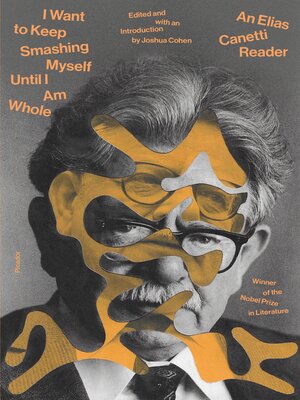
Sign up to save your library
With an OverDrive account, you can save your favorite libraries for at-a-glance information about availability. Find out more about OverDrive accounts.
Find this title in Libby, the library reading app by OverDrive.



Search for a digital library with this title
Title found at these libraries:
| Library Name | Distance |
|---|---|
| Loading... |
"A brilliant selection . . . Canetti's range astonishes." —Claire Messud, Harper's
A career-spanning collection of writings by the Nobel laureate Elias Canetti, edited and introduced by Pulitzer Prize winner Joshua Cohen.
He embarked on no adventures, he was in no war. He was never in prison, he never killed anyone. He neither won nor lost a fortune. All he ever did was live in this century. But that alone was enough to give his life dimension, both of feeling and of thought.
Here, in his own words, is one of the twentieth century's foremost chroniclers: a dizzyingly inventive, formally unplaceable, unstoppably peripatetic writer named Elias Canetti, who was awarded the Nobel Prize in Literature in 1981. I Want to Keep Smashing Myself Until I Am Whole is a summa of Canetti's life and thought, and the definitive introduction to a writer whose genius for interpreting world-historical changes was matched by a keen sense of wonder and an abiding skepticism about the knowability of the self. Born into a Sephardi Jewish family in Bulgaria, Canetti later lived in Austria, England, and Switzerland while traversing, in writing, the great thematic provinces of his time: politics, identity, mortality, and more. Sourced from Canetti's landmark texts, including Crowds and Power, an analysis of authoritarianism and mobs; Auto-da-Fé, a darkly comic, daringly modernist novel about the fate of European literature; the famous sequence of sensory-titled memoirs, including The Tongue Set Free and The Torch in My Ear; and never-before-translated writings such as the posthumous The Book Against Death, this collection assembles its luminous shards into the fullest portrait yet of Canetti's remarkable achievement.
Edited and introduced by Pulitzer Prize winner Joshua Cohen (Book of Numbers, The Netanyahus), I Want to Keep Smashing Myself Until I Am Whole leads us from Canetti's polyglot childhood to his mature preoccupations, and his friendships and rivalries with Hermann Broch, James Joyce, Karl Kraus, Thomas Mann, Robert Musil, and others. This collection is also interspersed with aphorisms and diary entries, revealing Canetti's formal range and stylistic versatility in flashes of erudition and introspective humor. Throughout, we come to see Canetti's restless fascination with the instability of identity as one of the keys to his thought—as he reminds us, It all depends on this: with whom we confuse ourselves.







